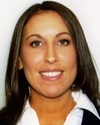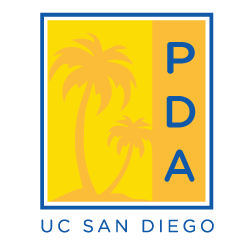
Quinlyn Soltow, Ph.D.
Research Scientist | ClinMet, Inc.

- Interview Overview
Interview Overview
Interviews by: Anjana Chandrasekhar
Editing: Alexandra Bortnick
1. Could you please list your previous department at UC San Diego and provide a brief description of the research you conducted?
I worked in the UCSD Department of Medicine - Division of Physiology for Dr. Mike Hogan. My research involved investigating the role of statin drugs on contractile properties and calcium handling of skeletal muscle using intact single myofibers, whole muscles, and whole animal models. Prior to working at UCSD, I did my first postdoc at Emory University with Dr. Dean Jones, where I worked on metabolomics of end-stage renal disease and frailty.
2. Could you describe your current job profile?
In August 2013, I started as an industry postdoc at ClinMet, Inc. (short for Clinical Metabolomics), and after six months, if I meet my benchmarks, I will be promoted to Research Scientist. ClinMet is a small start-up company located in the Janssen Labs incubator in La Jolla. Because ClinMet is a start-up company with <10 employees, I get to wear many hats, and every day is different – from project management to marketing to bench work. My primary project involves method development using liquid chromatography-mass spectrometry to detect small molecules in biological specimens collected from patients in client-conducted clinical trials. The mission behind the company is to utilize metabolomics to help pharmaceutical companies sharpen their clinical trials by determining drug effects on a metabolomic signature panel focused on diabetes, kidney disease, obesity and cardiovascular disease, and providing drug-specific and predictive biomarkers pre- and during treatment.
3. What made you decide to transition into your current position?
There were two main reasons for my decision to transition into my current position at ClinMet. 1) Like many labs these days, our lab at UCSD was running out of funding, and I needed to find another job; 2) I have always wanted to return to the field of metabolomics as my career focus. I was never set on going into biotech, but after being in academia for over 10 years, I was ready to try something new where my job wasn’t so dependent on grant writing.
4. Apart from the research you conducted, do you feel like anything in particular has helped you to acquire your current position?
There are few things that helped me find my current position at ClinMet. 1) I joined Association for Women In Science (AWIS); and 2) I updated my LinkedIn profile and joined many local biotech-focused LinkedIn groups, including BIOCOM, Oxbridge Biotechnology Roundtable, San Diego Biotechnology Network, and San Diego Life Science Network. Both AWIS and these LinkedIn groups sent me emails daily on various networking opportunities and job postings. I did apply to jobs the old-fashioned way by responding to job posts on company websites, but this was not useful at all. As overwhelming as it was, I forced myself to read every LinkedIn and AWIS email and attend as many networking opportunities that I could squeeze into my schedule. Interestingly, what finally landed me this job was a LinkedIn posting by a member of AWIS about an undergraduate career fair at UCSD. I don’t know why, but I decided to browse the companies that were attending the fair, and I saw ClinMet. As a postdoc, I probably was not “supposed” to attend this career fair, but I went anyway. ClinMet was not looking to hire a postdoc, but because I was such a perfect fit for their company, they essentially created a position for me.
5. Could you list some of the most striking similarities and differences between your post-doc and current position?
Similarities - Because the founder of our company is an academic professor, there are a lot of similarities with academia in terms of the way we interact and function on a daily basis, and we still design experiments with the goal of writing the results into manuscripts. Because we are a startup company, we don’t have disposable funds like some of the larger pharma/biotech companies, so we still have be watchful of our spending.
Differences - In my current position, we definitely have more meetings, stricter hours, and harder deadlines than in my postdoc. Additionally, we keep weekly logs of our goals and benchmarks and comment accordingly if we don’t meet these. Lastly, I have noticed that personal skills, networking and management skills are integral for success in industry. I try to take time each day to meet and talk to other companies in the Janssen Labs incubator.
6. Is there any specific challenge (during the entire process of transitioning) that you would like to highlight and if so how did you overcome it?
The toughest thing for me was altering my schedule. I am not a morning person, but my manager wants me to work from 8am to 5 or 6pm. As an academic postdoc, I had more flexibility in my schedule.
7. Could you describe your goals and ambitions for the next 5 years?
My ambition over the next five years would involve helping ClinMet grow into full service company, where we would provide everything from sample analysis to results pertaining to predictive health and personalized medicine for not only pharma but also the health care system. As ClinMet grows, my goal would be to move to a project management position, where I can still remain connected to the bench but also have input in scientific direction.
8. What do you feel you could have done more, as a Postdoc, to help prepare you for or acquire your current position?
Postdocs are so tuned into their specific field and so focused on their research, we forget to take time to connect to the world and see what is happening in our community. We are fortunate to be in San Diego, one of the largest biotech clusters in the country, so we should take advantage of the many networking activities, career fairs, and societies that are available to us. Joining AWIS was the catalyst that led to my current job, and reading posts on LinkedIn tied me into where pharma and biotech are currently focusing their science.
9. What do you feel is the most important advice you can give to a current UCSD Postdoc in order for them to obtain a position such as yours?
1) If you are a woman, join AWIS. 2) Update your LinkedIn profile. 3) Join LinkedIn groups that are in fields where you have experience or want to work. 4) Read the posts/emails on LinkedIn for these groups – this is daunting because you will get A LOT – but you only need to find that ONE networking session or career fair that will land you that job! 5) Don’t limit yourself and be creative in your job search – just because a job isn’t listed or doesn’t exactly fit your skill set, doesn’t mean there isn’t a need or fit for you.
